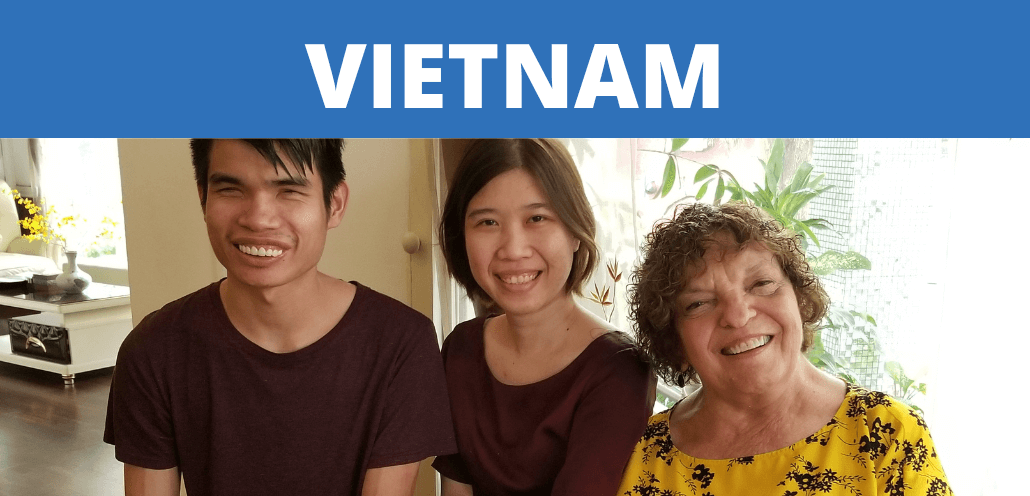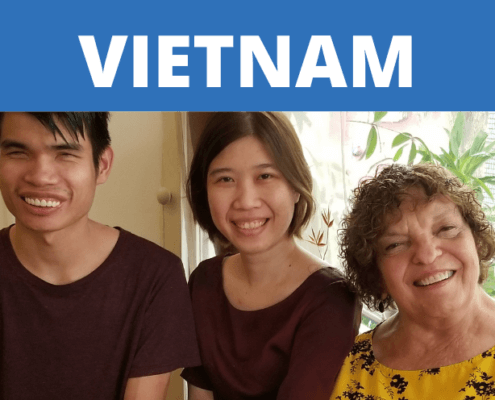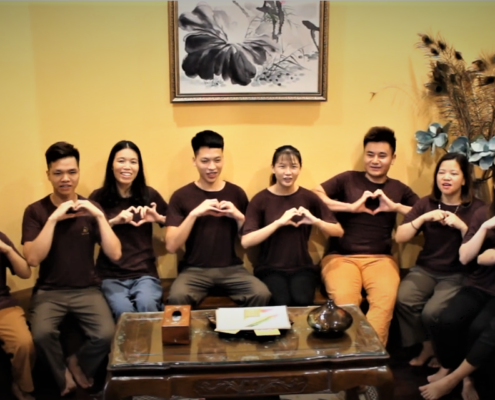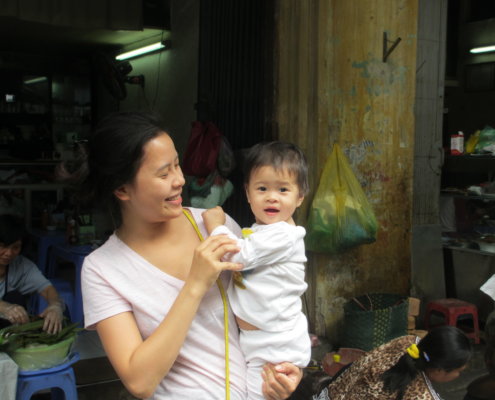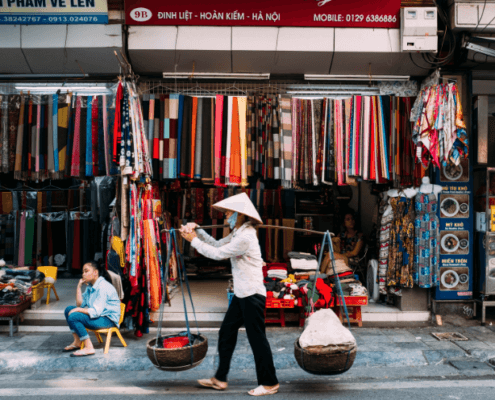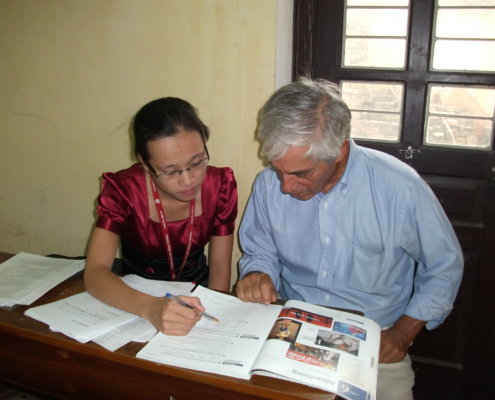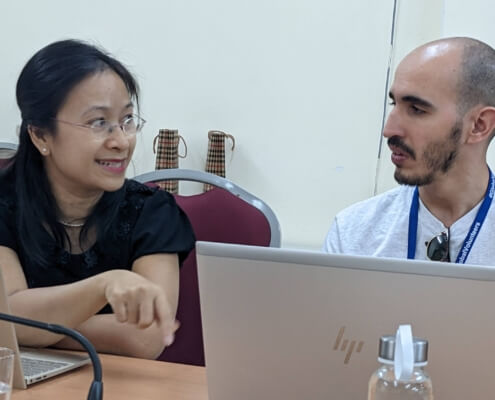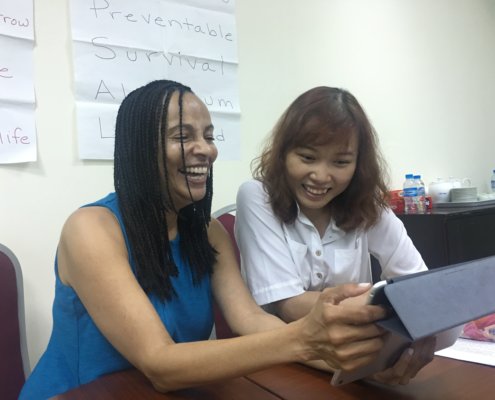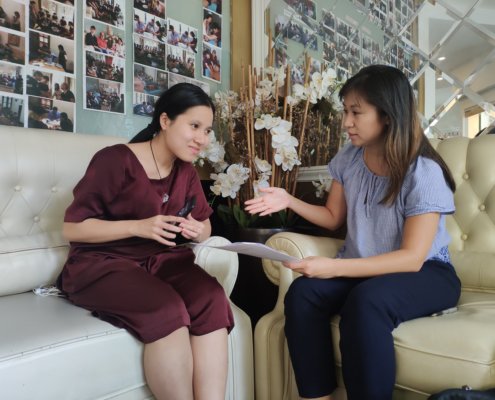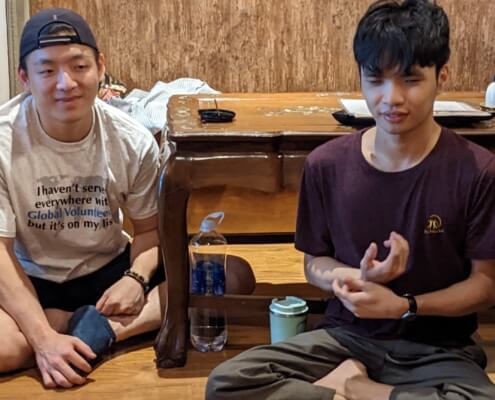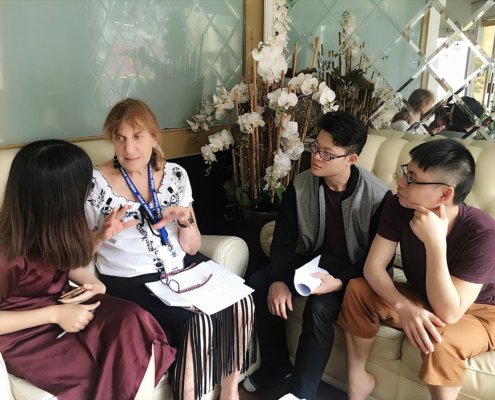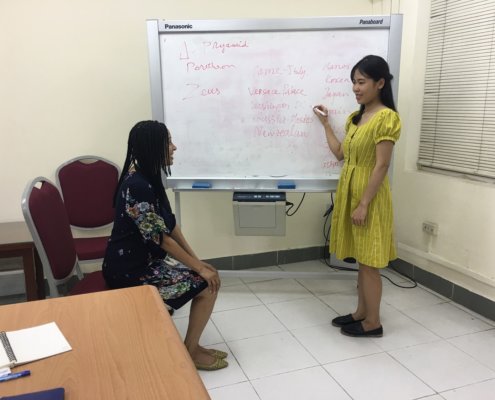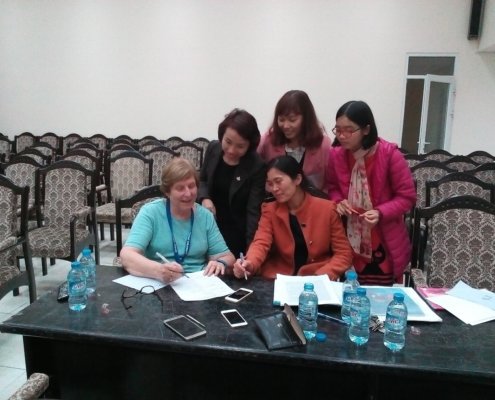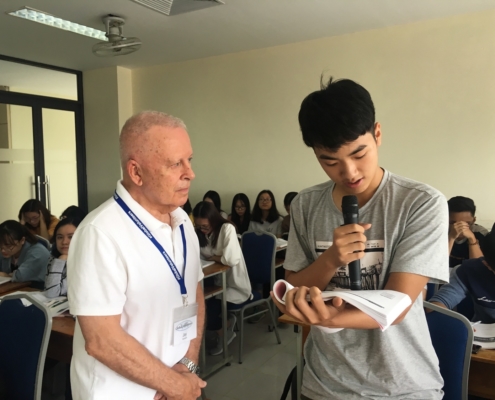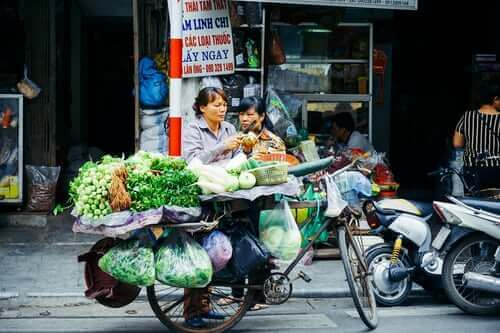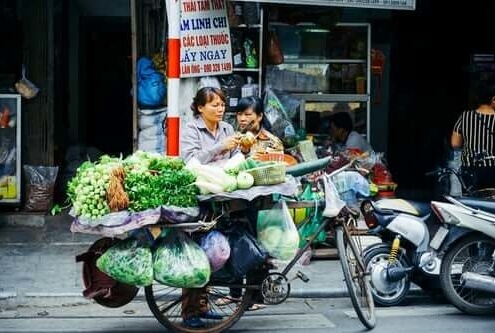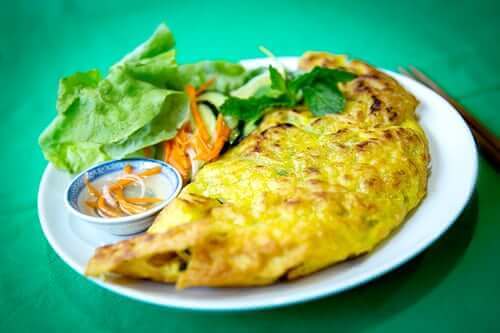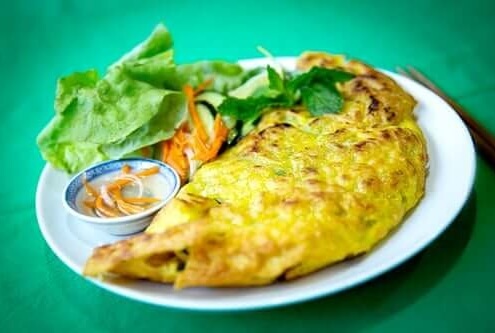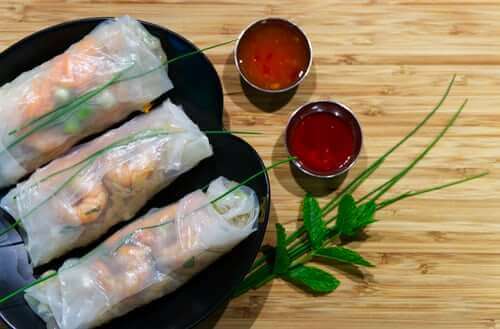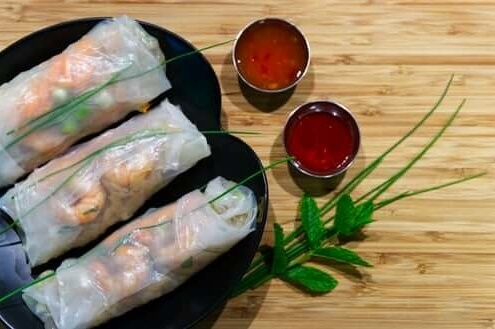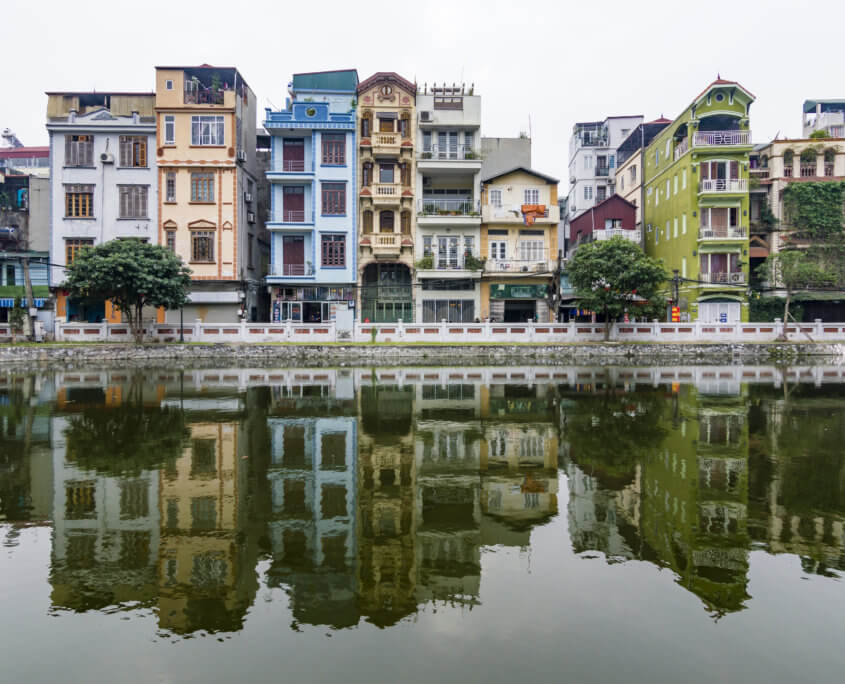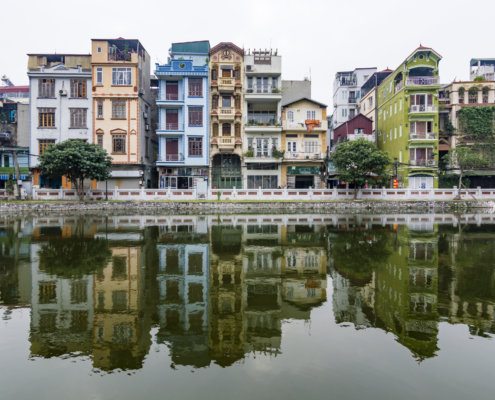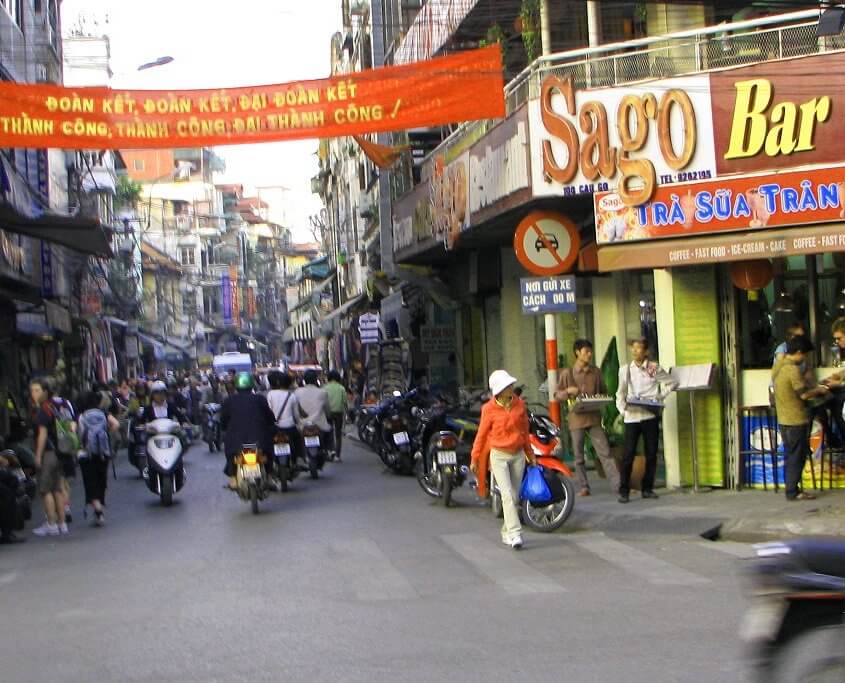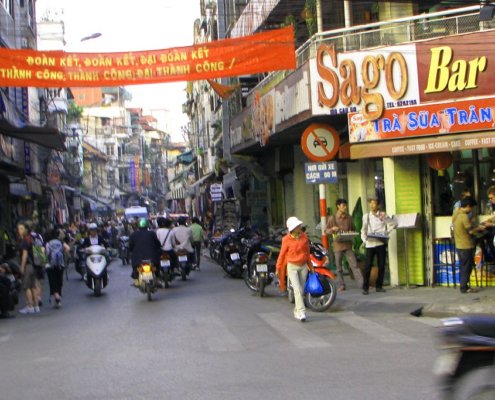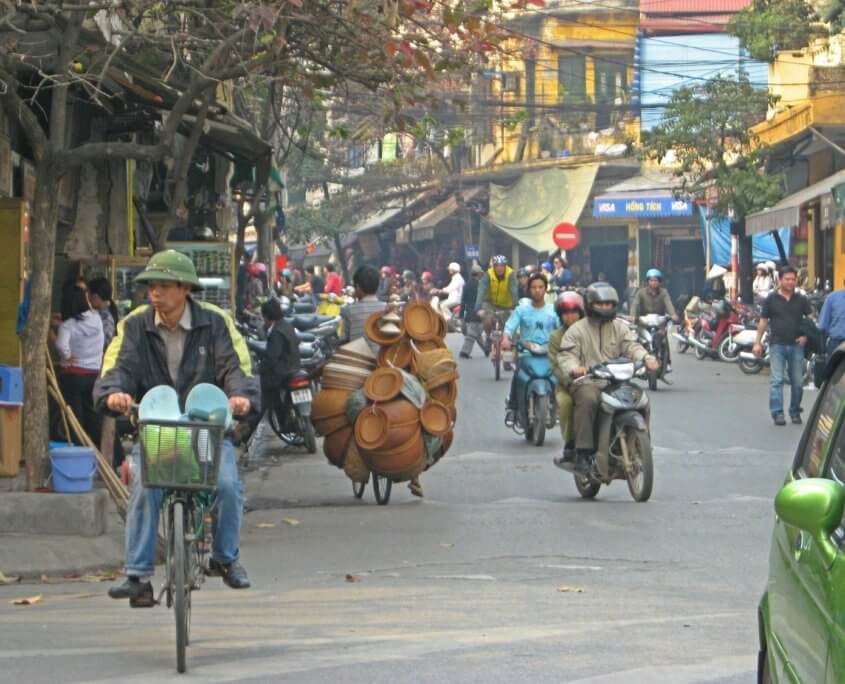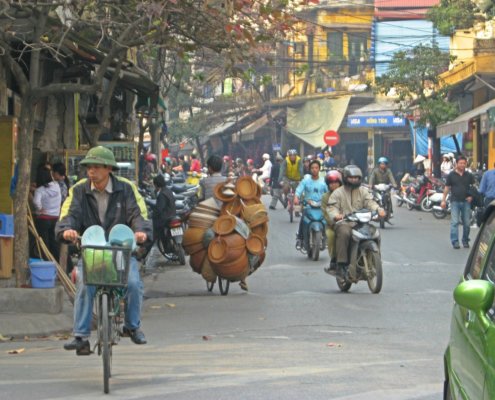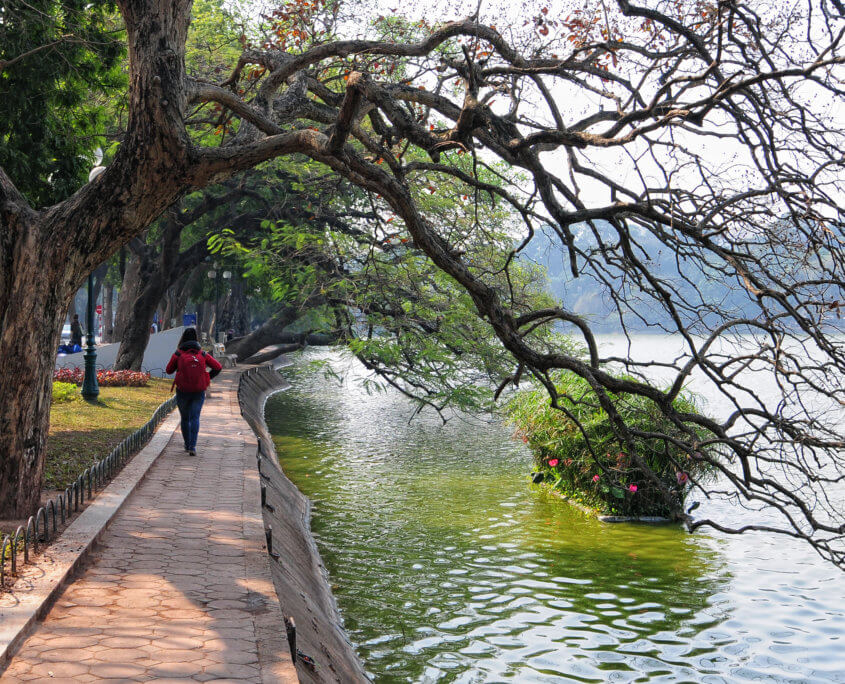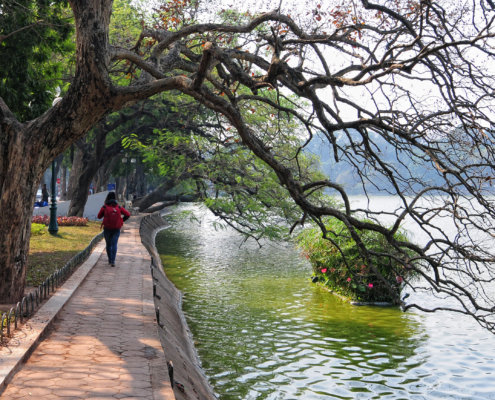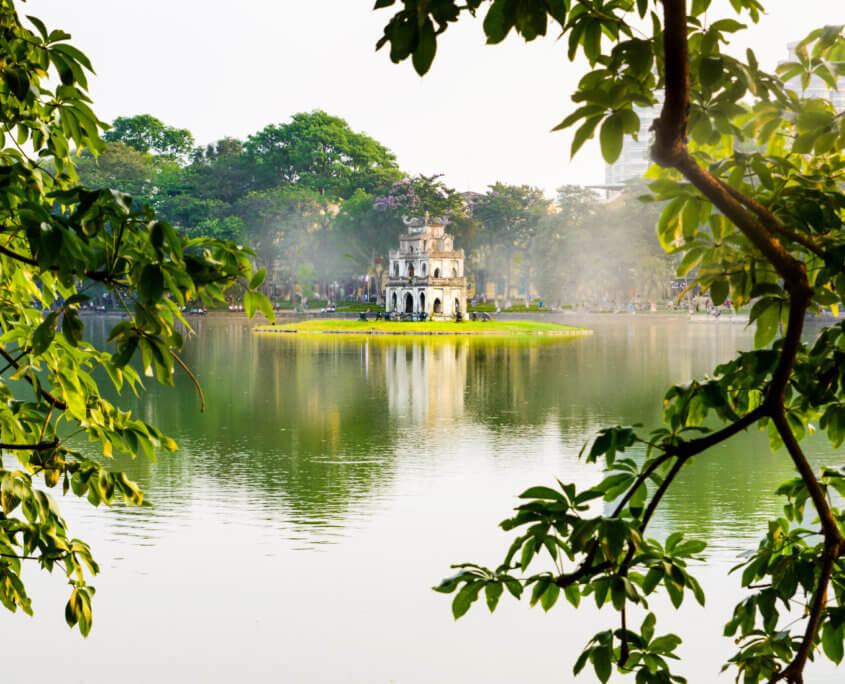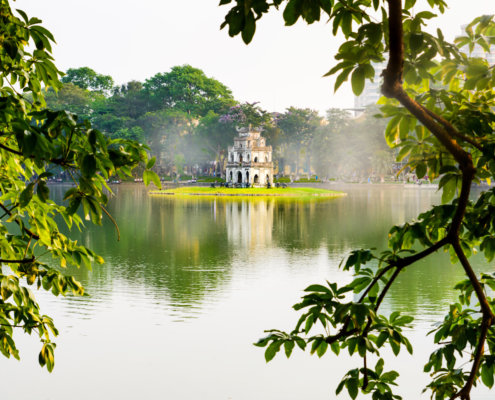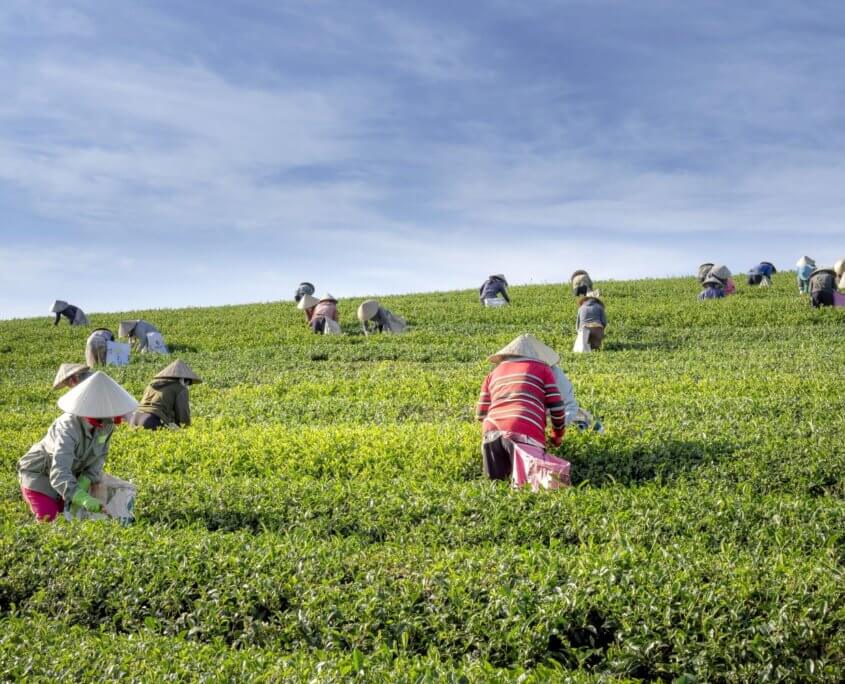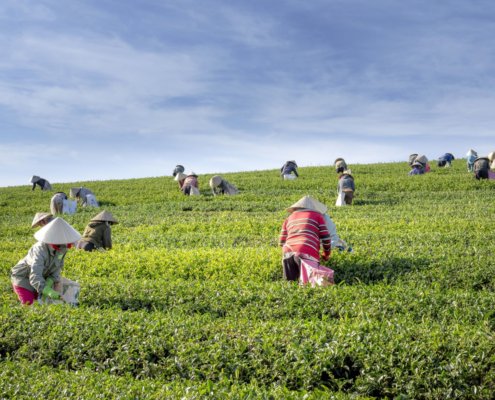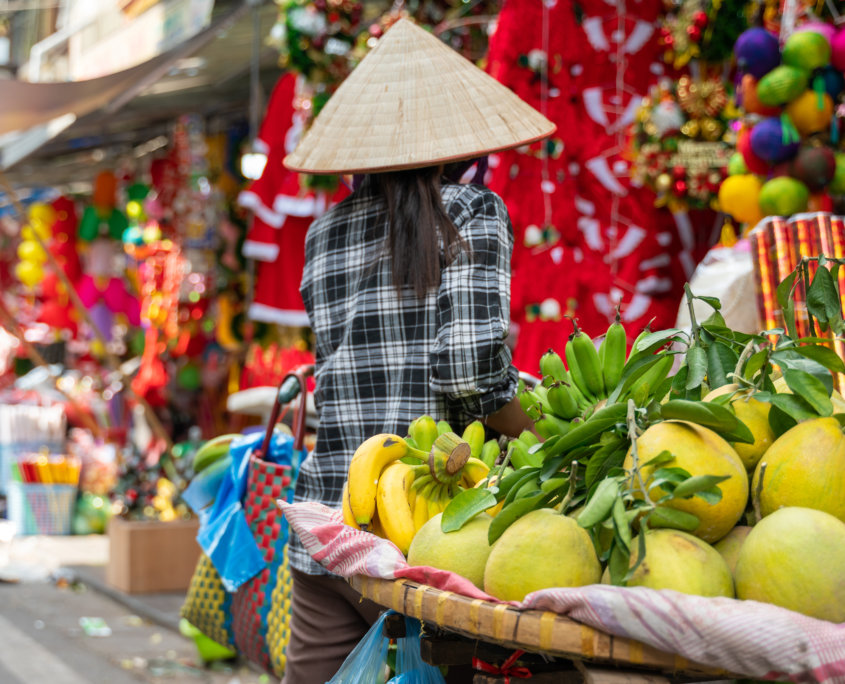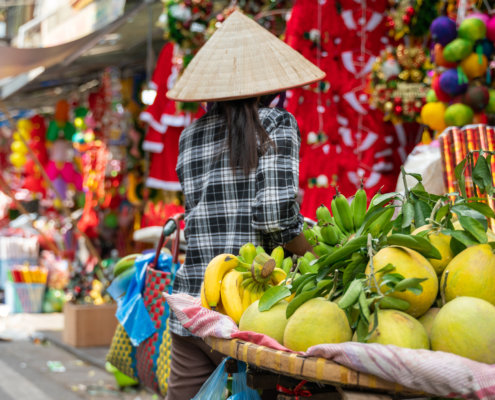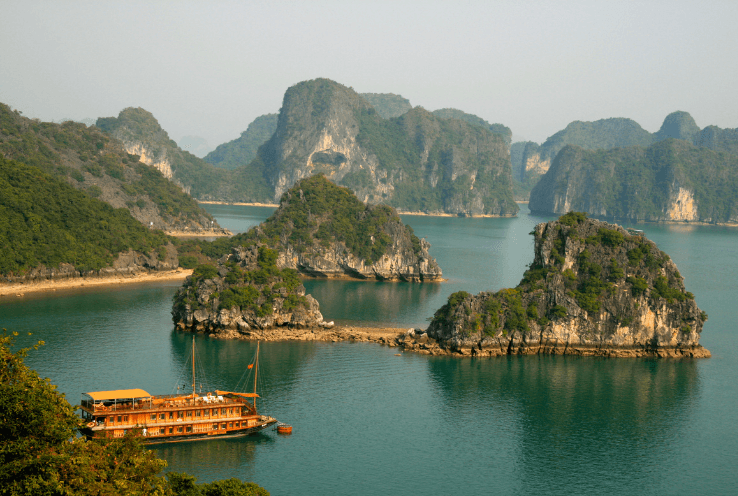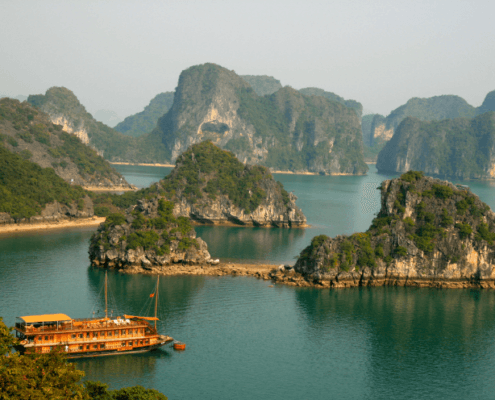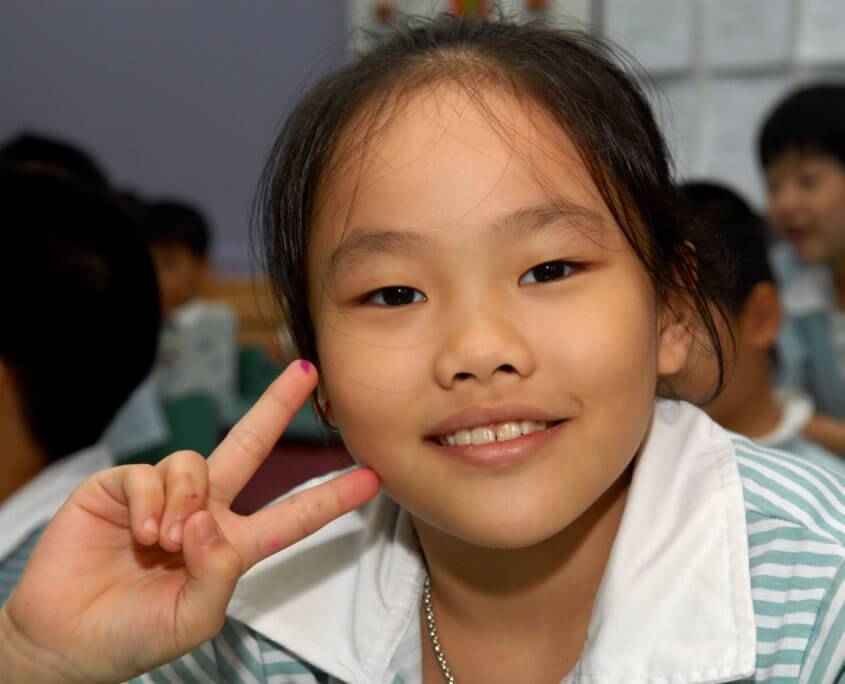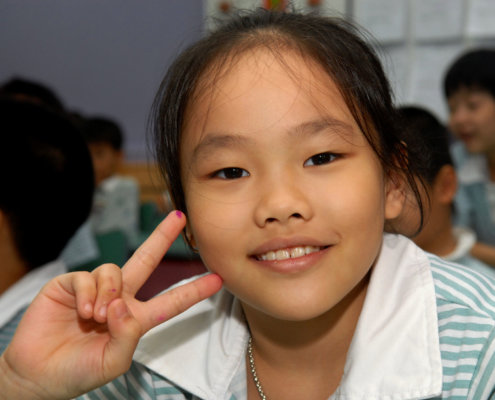Serving in Vietnam
From the fringes of the Red River Delta – where the ancient origin of Vietnamese language, art, and culture was nourished 5,000 years ago – to metropolitan hubs like Hanoi where the results of a series of free-market reforms are evident, Vietnam is transforming rapidly and embracing its heritage and future with many challenges. With great enthusiasm, Global Volunteers welcomes you to the charming city of Hanoi to build mutual understanding with the Vietnamese people with their ambitious educational and economic goals. The lack of teaching staff and resources are two main obstacles nationwide. Poverty is still evident even in urban cities. People with disabilities are left with few opportunities for education and employment, in spite of their efforts.
This is our second invitation to Vietnam, where from 1994 to 2003, we taught English and helped with community infrastructure projects in the southern part of the country. We began our current project in 2008 and have already seen positive results. Here’s how you can help:
- Using Global Volunteer’s Conversational English Teaching Guide and your personal creativity, offer classes to adult learners and university students.
- Share your knowledge in the profession of business with university students.
- Help young adults with impaired vision with their conversational English and increase their employability as trained massage therapists.
Community Partner & Work Projects
Our host organization in Vietnam is the Department of International Cooperation in the Ministry of Education and Training where we have been serving since 2008. The goal of our hosts is to help the students improve their English and support the goals of the department to have all subjects taught in English. At the invitation of the Department of International Cooperation, you can teach conversational English to students at four educational institutions: the Foreign Trade University, Blind-Link, Hanoi Logistical Association, and the Vietnam Institute for Development Strategy. Having the opportunity to practice conversation and other language skills with native speakers is very important to Vietnamese students. Talking about the American lifestyle and culture prompts students to interact, question, and practice their speaking ability. It’s largely through sharing life stories and experiences that the teaching, the learning, and the friendships occur!
Foreign Trade University is a public university and is considered one of the top institutions of higher learning in Vietnam. A multidisciplinary university, it offers diversified and competitive training programs to 16,000 students and has three campuses throughout the country, the main one in Hanoi. Two lecturers, Thi Diem Phuc Vu and Nguyen Thị Hie’n Hoa work with volunteers in their work projects at this university. There is a great need for upper-level teachers at the Foreign Trade University so if you have experience teaching at the university level, you can be of great service to the students and staff here. This university has expressed that volunteers with professional teaching experience in economics, business, law, or finance would be of great help to its students as well. You might be able to lecture and team-teach with professors in classes where students already have a high level of English. The idea is for volunteers to deliver a lecture on a professional subject matter – the primary objective being for students to hear lectures in English delivered by native speakers of the language. The students at the Foreign Trade University are very bright and eager to learn. Many enduring relationships have developed between the students and volunteers.
Blind-Link is a private, non-profit center teaching job skills to young adults who are visually impaired. They facilitate training in Massage Therapy for students who are blind and need volunteers to teach conversational English. Training to be massage therapists gives these young men and women an opportunity to be employed in a field that gives them pride and dignity and provides them with a self-sustainable wage. Huong Nguyen developed this program at Blind-Link and works with your team leader to organize the work efforts. Her goal is to have Blind-Link become self-sustaining. The Blink-Link spas have continued to grow in recent years and needs your help teaching conversational English to its students. Seventy percent of the spas’ clients are foreigners and all of the staff need to speak English in order to communicate with their clients. Volunteers teach basic English language lessons in groups of two or three students through simple conversations and fun activities for half or full days at Omamari or West Lake Spas. Volunteers work with small groups to practice phrases that will help them to interact with English-speaking clients in the reception area, on the phone, and in therapy sessions.
The Vietnam Institute for Development Strategy (VIDS) is a leading think tank in Vietnam that researches and makes recommendations regarding national socio-economic development strategies. In 2015 VIDS requested Global Volunteers’ help with their English Communication Program, which aims to help its high and mid-ranking officials gain confidence in speaking English and to help the bright young researchers gain the skills necessary to give presentations in English. Volunteers at VIDS teach groups of up to three students with daily conversational English, pronunciation, and vocabulary and practice regarding socioeconomic topics. Each Global Volunteer will be paired with a local volunteer who will help with preparing teaching materials and any other logistical issues. They can also help with translation when needed. Volunteers with teaching experience can be especially helpful here, but this is not a requirement. Simply being a native speaker of the language and helping students improve their pronunciation is a great service to them. Mr. Truong is the vice president of VIDS and works closely with your team leader to facilitate the volunteer experience. VIDS needs volunteers only during some service programs.
Ha Noi Logistics Association (HNLA) invited Global Volunteers to assist its members in enhancing their conversational English skills. Established in 2022 by the Ha Noi People’s Committee, HNLA aims to foster logistics activities in Hanoi, Vietnam’s capital, responding to the heightened demand for e-commerce logistics in recent years. The association assumes a pivotal role in bolstering the country’s socio-economic development by acting as a liaison between the city government and the logistics sector, offering counsel on policies pertaining to logistics activities. Mr. Tran Duc Nghia, Chairman of HNLA and General Manager of Hanoi Delta Logistics company, places significant emphasis on the importance of improving the English skills of the staff. With 85 members, HNLA’s workforce primarily consists of individuals aged 22-40 with limited English proficiency and a lack of confidence in verbal communication. Volunteers are invited to teach the association’s members in small groups — one in the morning and another in the afternoon—to provide targeted language support. Volunteers with a business background would be welcomed at HNL, but it is not necessary.
Service Program Logistics
Team Leaders
All programs are led by a trained team leader experienced in managing diverse groups of people. In cooperation with the community leaders, your team leader will facilitate your team’s orientation, assist you in becoming fully engaged in the work project, and manage all project-related logistical issues.
Meals
Three meals a day are included in your service program contribution. Meals are taken at the hotel, local restaurants, and the institution where volunteers serve. The hotel provides an international breakfast buffet, seasonal fruit, and bottled water daily. The delicious Vietnamese cuisine offers vegetables, rice, eggs, soup, noodles, chicken, pork, and beef. Common ingredients include fish sauce, shrimp paste, soy sauce, rice, fresh herbs, fruits, and vegetables and recipes typically use lemongrass, ginger, mint, long coriander, Saigon cinnamon, and basil. Traditional Vietnamese cooking is greatly admired for its fresh ingredients, minimal use of oil, and excellent use of herbs and vegetables, and is considered to be one of the healthiest cuisines worldwide. Desserts, soft drinks, and alcoholic beverages are readily available for an additional charge.
Lodging
Volunteers stay in double accommodations at the 4-star Hanoi L’Heritage Hotel. Single rooms are available for an additional fee. Each room has air conditioning, in-room telephones, private baths with hot and cold water, free wireless internet, a mini-fridge, a safe, and a flat-screen with cable TV with English channels. A buffet breakfast is served at the hotel with Asian and Western dishes. It has a well-appointed spa with services available on call. The gym is adequately equipped for those wishing to keep fit.
Transportation
All in-country transportation is included in your service program fee. You will be picked up at the Hanoi International Airport on the first day of your service program and driven to the hotel by taxi. The ride is about 30 minutes. You will also be taken to the airport on the final day of your service program. Some volunteers for Blind Link walk about 15 minutes to the Omamori Spa in the historic area of Hanoi. Each day, the team will take taxis to other project sites. The ride ranges from 20 to 40 minutes.
Note: transportation for free time activities is not included.
Program Mobility
Accurately assess your functional mobility. Our work assignments and partner communities require varying levels of physical stamina and mobility. After you register, you will be asked about your physical capabilities relating to your mobility. Please answer the questions honestly.
Required Mobility for Vietnam: Mobile – Walk 1 mile, climb five flights of stairs, walk on uneven terrain, and get on and off buses independently.
Street vendors, both retailers and food purveyors, set up shops on the sidewalks. Motorbikes are parked on the sidewalk instead of the street, so volunteers often need to navigate congested and uneven sidewalks and walk next to them near moving motorbikes. In addition, pedestrian rights-of-way are not observed in Vietnam.
Free-Time Activities
There are many exciting things to do in Hanoi in the evenings and on the weekends. You can visit craft markets, parks, lakes, the Ho Chi Minh Mausoleum, and art galleries. You can also visit the prison that was used to incarcerate the Vietnamese during the French occupation and where U.S. soldiers, including John McCain, were held during the Vietnam War, which is referred to as the “American War” in Vietnam. This prison is referred to by Americans as the “Hanoi Hilton.” There is a Water Puppet show just about a ten-minute walk from the hotel.
You may also visit the oldest church in Hanoi, St. Joseph’s Cathedral. This late 19th-century gothic revival church has an architectural style resembling Notre Dame de Paris and was one of the first structures built by the French colonial government in Indochina. Also, the Vietnam Museum of Ethnology is a must-see focusing on the 54 officially recognized ethnic groups in Vietnam. It is widely considered to be the finest modern museum in Vietnam and a large tourist attraction. The building is shaped like a dong son drum. There are wonderful outdoor displays of villagers’ homes.
The Temple of Literature was built in 1070 and is one of several temples in the country which are dedicated to Confucius, sages, and scholars. This is the temple that is featured on the back of the 100,000 Vietnamese đồng banknote. The Ho Chi Minh Mausoleum is a large memorial located in the center of Ba Dinh Square, where Ho Chi Minh, chairman of the Communist Party of Vietnam from 1951 until his death in 1969, read the Declaration of Independence on September 2, 1945, establishing the Democratic Republic of Vietnam.
On the weekend, you can travel to visit the resort area of Halong Bay or view the beautiful pagodas and rice fields of nearby Ninh Binh. HaLong Bay is an extraordinary overnight trip where you have the opportunity to spend the night on a boat and experience a different culture. Mai Chau is a wonderful stilted village North of Hanoi inhabited by White Thais. The women in the community weave silk scarves. Mai Chau is a great opportunity for volunteers to stay in one of the family-owned stilted homes.
Service Program Contribution
Global Volunteers’ service program contribution covers all lodging in double accommodation, three meals a day, in-country team transportation, emergency medical evacuation insurance, all preparatory and orientation materials, onsite orientation, a full-time team leader, and administration costs. The Vietnam service program contribution is at this link: Dates and Fees for Global Volunteers’ Programs. Please ask your Volunteer Coordinator about referral credits as well as discounts for students, companions, groups, and alumni volunteers. We encourage you to use Global Volunteer’s online fundraising tool where you can create a personalized webpage to request partially tax-deductible donations from family and friends to help cover your service program contribution. Airfare and free time activity expenses are your responsibility. The service program contribution and airfare are tax-deductible for U.S. taxpayers.
“I was in Vietnam during the war and it was important for me to return. I have to admit that I always thought of Vietnam as a war…but now I think of it as a vibrant country with extraordinary people who are eager to become successful in the new world they live in. It is an honor for me to be here….to work with the students and their extraordinary teacher.”
~ Global Volunteer in Vietnam
Call one of our Volunteer Coordinators at 800-487-1074 to register or reserve your spot online.
You CAN make a world of difference!
